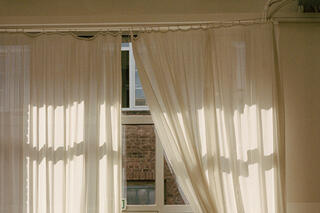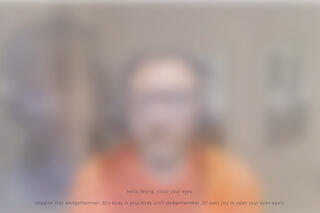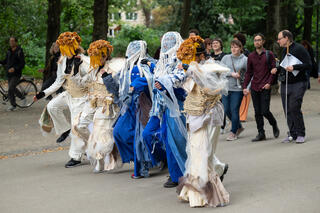Our History
2022 - 2023
With the 2022/23 season, Ingrida Gerbutavičiūtė kicks off her directorship. With the dance scholar, dramaturge and curator Ingrida Gerbutavičiūtė, the Düsseldorf cultural institution has gained an internationally experienced dance expert. Following the question May I hug you?, the season focuses on the physical experience in pandemic times and examines how encounters and relationships can arise in the new reality. International guest performances, workshops, mediation and research programmes deal with the changed perception of one's own corporeality, questions about physical presence as well as boundaries, norms and possibilities to be renegotiated. Furthermore, the first Open Studios after the Corona pandemic take place and the Academy resumes its full course programme. As in the past, the tanzhaus nrw hosts the Internationale Tanzmesse NRW and the Tanz NRW Festival. The "Raving Choreographies" series invites various choreographic perspectives on techno and rave culture throughout February 2023, negotiating techno, its diverse subgenres and dance practices. Included: community raves as well as a techno party for babies.
Highly gratifying: after several pandemic years, the visitors turn up again in the same numbers as before Corona. In addition, the tanzhaus nrw receives the building permit for the urgently needed construction project to renovate the building and is still waiting for the financing and implementation decision by the city of Düsseldorf.
2020
Details will follow soon.
2019
How much robot can a human take?
HI, ROBOT! DAS MENSCH MASCHINE FESTIVAL, initiated by tanzhaus nrw, was dedicated to the bodies of the future within the arts from March 13 to 31, 2019. In co-operation with the NRW-Forum as well as with the Black Box-Kino at the Filmmuseum, supported by the Kulturstiftung des Bundes/ Federal Culture Foundation, the festival collected voices from dance, performance, visual arts, sciences and coding in more than 20 events, posing the question: How much robot can a human take? The different voices, among them the fascinating “Scary Beauty” concert conducted by humanoid robot Alter 3, veered between fascination for and scepticism towards technology while opening a long overdue debate on the encounter between human and machine in performative arts. HI, ROBOT! views itself as a continuation of the discourse on body images in the 21st century that is taking place at tanzhaus nrw, starting with the Real Bodies series in 2016. The title HI, ROBOT! signifies both a bow before Isaac Asimov’s tale “I, ROBOT” that was turned into a 2004 blockbuster as well as an address of welcome and an invitation to meet.
Also, this: Following last year’s successful first edition of “Claiming Common Spaces” at HAU Hebbel am Ufer Berlin, tanzhaus nrw and FFT Düsseldorf extended their invitation to attend the second edition in Düsseldorf, titled “Claiming Common Spaces II: Kunst & digitales Leben (Art & Digital Life)”. The joint project by the Alliance of International Production Venues was conceived as an artistic congregation free from any bias, asking: How do techniques and discourse of digital culture filter into artistic work?
May in North Rhine-Westphalia was devoted to dance: Biannual festival tanz nrw broadened its reach and range with more than 60 events, different publication formats and workshops, an open studio and an installation, and also with 41 performances, among which were four premieres. The North Rhine-Westphalia-based choreographers toured the nine festival cities Bonn, Essen, Düsseldorf, Cologne, Krefeld, Mülheim/Ruhr, Münster, Viersen and Wuppertal for a total of twelve days.
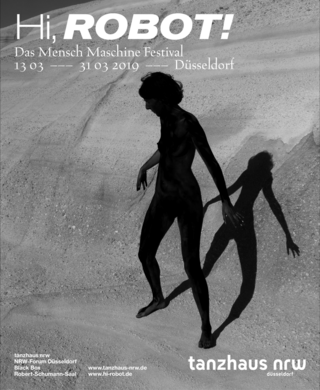
2018
Happy Birthday, tanzhaus nrw!
Two large industry gatherings took place in North Rhine-Westphalia, first Tanzplattform Deutschland in Essen from March 14 to 18, 2018, followed by the Internationale Tanzmesse NRW in Düsseldorf from August 29 August to September 1st. tanzhaus nrw was pleased to contribute to the Tanzplattform with three tanzhaus nrw coproduced performances: “Princess” by Eisa Jocson, “Inoah” by Bruno Beltrão as well as William Forsythe’s “Catalogue” for Dance On Ensemble. They had all guested at the house in the previous months. tanzhaus was especially proud of the fact that two of the three Factory Artists were actually included in the Tanzplattform programme: “The Way you Look (at me) Tonight” by and with Factory Artist Claire Cunningham as well as Jess Curtis’ and Factory Artist Ligia Lewis’ “minor matter”.
We believe that anniversaries are useful rituals, and so we celebrated: 40 years of the support association (January 26, 2018) as well as 20 years of tanzhaus nrw’s Erkrather Straße premises from April 26 to 29, 2018! tanzhaus nrw’s spectacular opening in a 4,000 square metre former tram depot took place in April of 1998, accompanied by the forward-looking decision to concentrate on the presentation, production and agency for contemporary dance. Since then, the house has been trading under the tanzhaus nrw name.
Also, this: The City of Düsseldorf granted the house a subsidy of 148,000 EUR so fire protection requirements and master key system could be brought up to required standards and expertise on the house’s dilapidated roof could be acquired. The house would like to extend its gratitude to 5,623 signees within four weeks, providing a wide audience for the house’s urgent need for restoration. In November, tanzhaus nrw received appreciation for its civil society engagement by the Heinrich Böll Foundation NRW. At the end of the year, the house also received the good news of the supported founding for the Alliance of International Production Venues throughout the coming three years by the Federal Government.
The tanzhaus-commissioned publication “Bodies of Evidence: Ethics, Aesthetics, and Politics of Movement”, a tome of 280 pages, edited by cultural sociologist Gurur Ertem and theoretician and dramaturge Sandra Noeth, was published on the occasion of the Leipzig Book Fair. The book, penned in English, gathers more than 20 voices from the arts, politics and civil society that encircle the human body’s relevance as a site of political and cultural resistance in present societies. The contributions, taking the forms of essays, interviews, dialogues and case studies, are dedicated to the questions: In what ways are bodies entangled in current crises, and which political and ethical consequences must therefore be discussed?

2017
The year began with excitement, on account of, among other things, the continuation of the successful program series REAL BODIES that concluded in April with Scottish activist Claire Cunningham and American choreographer Jess Curtis. This was followed in June by artists’ conference INVENTUR 2 that, together with 250 audience members, scrutinised dance in the context of a world of rapid social and political change.
Between Education Venue and Community Space
A short while later, tanzhaus nrw, along with seven other theatres, was the recipient of the endowed Federal Theatre Award. The jury’s explanatory statement read “After decades of continuity, tanzhaus nrw dared to venture into a new start with Bettina Masuch as artistic and managing director in 2014. Since then, local ties have been strengthened and youth offerings continued at Junges Tanzhaus. Additionally, the house gained international appeal by means of close collaboration with its Factory Artists. Thematic claims such as Real Bodies or the “Zusammen (Together)” series signalled a turn towards social topics that are reflected in artistic aesthetics. Situated between education venue and community space, tanzhaus nrw also builds bridges towards our times’ international discourse with conferences like Inventur 2. tanzhaus nrw accordingly succeeds in connecting artistic avantgarde, current topics and the urban society that is, in dance, in practicality, at home there. The house utilises its focus on dance for community building in movement.”
Before the new season started in September with a happening by Icelandic choreographer Erna Ómarsdóttir within the frame of the new programme series CEREMONY NOW!, tanzhaus nrw announced its new Factory Artists for the coming two years, Claire Cunningham, Ligia Lewis and Choy Ka Fai. CEREMONY NOW! was dedicated to rituals of collectivisation during its various stage performances. Additionally, Ingri Fiksdal and Bouchra Ouizguen brought pieces to Düsseldorf that were conceived for outside spaces: Ingri Fiksdal situating her impactful ”Night Tripper” in a forested area near Unterbacher See, Bouchra Ouizguen playing public spaces in Düsseldorf’s town centre with her female ensemble. The idea of moving out into the city from the house was also followed on by the “Residenzen im Realen/ Residencies in Reality” in which artists utilised Diakonie Flingern, one of the German Red Cross Zentrum Plus venues as well as a gym for their research.


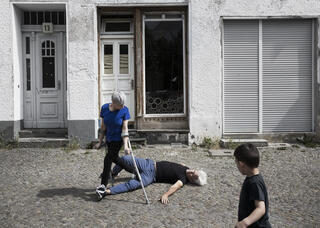
2016
First of all, this much dance is rare indeed: With three industry gatherings in this country – Tanzplattform Deutschland in Frankfurt am Main from March 2 March to 6, Tanzkongress in Hanover from June 16 June to 19 as well as the Internationale Tanzmesse in Düsseldorf from August 31 until September 3 -, 2016 proved to be a year of dance! And what about us who view dance as our daily business all year ‘round? With thematic claims such as REAL BODIES, our Factory Artists’ most recent works with a high participation factor as well as with the development of our activities as a production venue for freelancing choreographers, tanzhaus nrw presses ahead with the process of change initiated by the change of artistic direction.
With the thematic REAL BODIES series at tanzhaus nrw, we put forth a clear signal for the house’s new direction: Dance perceived in society’s centre. With REAL BODIES during this season, we show people on stage whose bodies do not conform to ideal images of the perfect young, fit dancer. Large bottoms, wrinkly cleavage and half-amputated legs are still in the world even if Gisele Bündchen does not accompany them. Why, then, do we only find words and categories for those who seem to arise from the Bündchen perspective? - Bettina Masuch, Artistic and Managing Director tanzhaus nrw

2015
Among the many things that rang in the new year was a focus on Factory Artists Alexandra Waierstall and Jan Martens. Additionally, the appeal “Düsseldorfer Kultur und Sport für Humanität/Respekt/Vielfalt (Düsseldorf Culture and Sports for Humanity/Respect/Diversity)” moved things in Düsseldorf, as it did in many other cities nationwide, taking a considerable stand against xenophobia, hostility towards foreigners and intolerance.
Also, this: Jan Martens received the Charlotte Köhler Award in July, honouring “the dog days are over”, co-produced by tanzhaus nrw, and was nominated as one of the “Year’s Most Promising” 33 by trade magazine “tanz”. Furthermore, tanzhaus nrw’s youth company, B2B Back to Basics, received appreciation for their work in the form of a nomination and an invitation of its production “Tabi” to participate in Tanztreffen der Jugend 2015 in Berlin, while the numerous Junges Tanzhaus activities also garnered acclaim, receiving the endowed Kulturjugendpreis der Sparkassenstiftung des Rheinlandes (Youth Culture Award of the Rhineland Sparkassen Foundation).
Alliance of International Production Houses launched
The Alliance of International Production Houses, supported by the State Ministry for Culture and Media, provides a strong network comprised of “seven of the greatest and most important venues with an international significance” (Press statement issued by the Federal Government). Apart from tanzhaus nrw, it includes FFT Düsseldorf, HAU Hebbel am Ufer Berlin, HELLERAU – European Centre of the Arts Dresden-Hellerau, Kampnagel Hamburg, artists‘ house Mousonturm Frankfurt am Main, and PACT Zollverein Essen.
At the start of the new 2015/16 season, tanzhaus nrw, together with numerous artists, posed questions for new forms of participation and communal experience of dance and makes statements about the social debate on migration with guest performances by Lia Rodrigues, among other things. Freshly launched project Shifting Realities, focussing on an exchange between artists from various African nations and Germany, supported by the Kulturstiftung des Bundes/ Federal Cultural Foundation, gathered speed with a first research stage at the Senegalese École des Sables in November

2014
New director Bettina Masuch dares “more than an update” following 35 years of the house under the same direction. “Everything is fresh – the corporate design colours, the programming and the new artistic and managing director’s appearance,” according to the assessment by leading European ballet, dance and performance magazine “tanz” on the signature of the theatre scholar, festival director and dramaturge. Anyway: From the 1970s artists’ and citizens’ movement arose a house with international acclaim that opens its doors to an average of 3,600 visitors per week and which today serves as a theatre and dance school, production venue and meeting point for dance creators from all over the world! The house has been receiving a lot of attention from all corners of the world since then, as an initiator of European projects, as a production partner, as an example of cultural education and as an international networking agent.
More than an update
Bettina Masuch, active as tanzhaus nrw’s artistic and managing director since January 1 2014, puts forth a distinct artistic statement with the 2014/2015 season. The four-day season opening in August was a glittering celebration, presenting artists such as Emanuel Gat and Ari Benjamin Meyers & Tino Seghal. A closer connection to Düsseldorf has been created by the house for three young artists – Alexandra Waierstall from Düsseldorf, Jan Martens from Antwerp and Sebastian Matthias from Berlin, installing each of them as a “Factory Artist”: tanzhaus nrw invites up to three choreographers with idiosyncratic signature styles for the duration of two years to enter into an intense exchange with the house, its staff and its visitors. In implementing this, the house seeks to establish a continuous work relationship with artists. tanzhaus nrw also issues a statement regarding the work conditions of contemporary choreographers through the idea of the Factory Artists, addressing work conditions that are marked by nomadic working, project-based funding and production pressures.
And, additionally: Tanzplattform Deutschland, of which tanzhaus nrw is a partnering institution, with Bettina Masuch on the jury of that year’s edition, issued an invitation to Hamburg in February, while the Internationale Tanzmesse NRW, the other important industry gathering, took place in Düsseldorf in August.
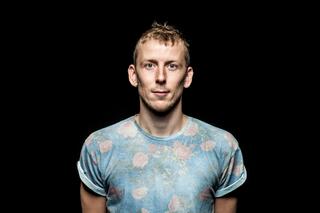
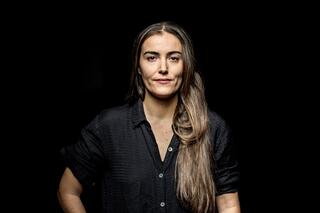

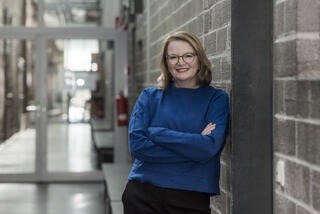
2013
The year started with the programme series “Back to the future – 35 Jahre tanzhaus nrw (35 years of tanzhaus nrw)”, supported by Kunststiftung NRW. The series ran throughout the year and focussed on the history of tanzhaus nrw and its preceding institution, “Die Werkstatt”, also putting in reference towards the house’s present and future. The anniversary coincided with Bertram Müller’s farewell, who retired from the house on age-related grounds on December 31st, 2013. Bertram Müller was one of the founding members of “Die Werkstatt” as well as longstanding artistic and managing director of tanzhaus nrw. He received a highly acclaimed appreciation of his lifetime achievement of building up tanzhaus nrw in the form of the Deutscher Tanzpreis/ German Dance Award 2014.
The longstanding artistic and managing director bid his farewell to audience, politics, colleagues and artists with a two-day rousing festivity! A complementary, comprehensive publication bearing the title “Das tanzhaus nrw, von der Utopie zum Modell für die Zukunft (tanzhaus nrw, from utopia towards a model for the future)”, published by Verlag Theater der Zeit and edited by Dr Johannes Odenthal, documents the house’s long development and history: What first came into being as an initiative driven by artists and citizens in the surroundings of an industrial wasteland as “Die Werkstatt e.V.” later structurally found its steps as a centre for dance’s cultural diversity under the direction of Bertram Müller before tanzhaus nrw, at the end of the 1990s, became an international model for the agency for dance as stage art and a way of life.
International model for the agency for dance as stage art and a way of life
Furthermore: The Internationaler Tanzkongress, in close cooperation with tanzhaus nrw, successfully took place in Düsseldorf from June 6 to 9, and the new 2013/2014 season started out with an inspiring meeting attended by numerous European dance houses and artists within the framework provided by EU-project modul-dance. Friedrich Becker’s (1922 -1997) kinetic disc art has been gracing tanzhaus nrw’s façade since December.

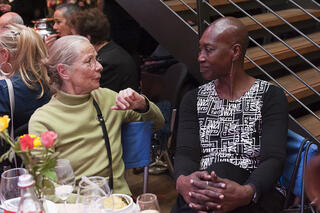
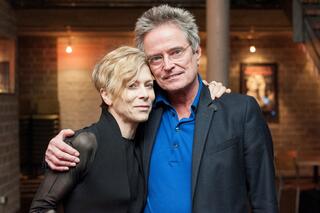

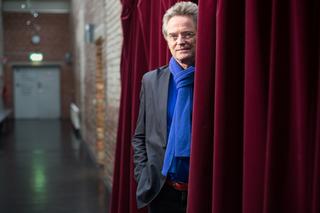
2012
With subsidies granted for projects Dance Dialogues Africa as well as for Benedikt Next Generation, both of them supported by the Kulturstiftung des Bundes/ the Federal Culture Foundation, tanzhaus nrw enters its 14th year at Erkrather Strasse. With guest performances by Saburo Teshigawara, Peeping Tom, Dave St-Pierre as well as by Louise Lecavalier and others, the house successfully continues its highlight series. The Internationale Tanzmesse NRW, taking place biannually, called the world of dance to Düsseldorf again from August 29 until September 1st.
Entering the stage without wolves
Announcing a performance by living swans and wolves during two guest performances, though, amounts to frenzied media coverage for tanzhaus nrw during the summer slump, triggered by Westdeutsche Zeitung and carried further by dpa and many other media outlets. Animal rights group PETA and their supporters were also up in arms, and consequently, tanzhaus nrw had to present French choreographer Coraline Lamaison’s piece without any living wolves, though not without the additional intervention by Düsseldorf’s district veterinary office beforehand.
In September, tanzhaus nrw announced Bettina Masuch as the designated artistic and managing director, succeeding Bertram Müller in January of 2014 after more than 35 years in office.
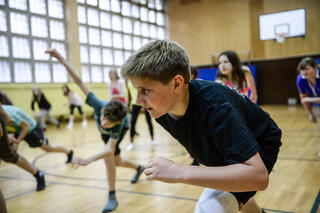
2011
The year began with the sixth edition of European festival TEMPS D’IMAGES, roughly translatable as “Time of Images”. The Global Dance Alliances series, dedicated to the idea of the “curating choreographer”, also received a lot of attention through renowned artists and groups such as the Australian Dance Theatre, Jan Fabre, Olga Pona and Gregory Maqoma. On the occasion of May 2011’s Eurovision Song Contest in Düsseldorf, tanzhaus nrw conjures up “großes Kino/ a magnificent show” (Rheinische Post) with its dance mob and more than 1,500 fellow dancers in the city centre.
Good news, too, for project Take-off: Junger Tanz: Its continued work could be secured via the aid of the City of Düsseldorf and the State of North Rhine-Westphalia. Within this project, tanzhaus nrw becomes a book editor for the first time for a publication bearing the title “Aufwachsen mit Tanz (Growing up with dance)”, published by Beltz Verlag in January 2011.
2010
January begins with series Sacre plus, presenting contemporary interpretations of Stravinsky’s 1913 classic throughout the year, among them versions by Marie Chouinard, Tero Saarinen, Raimund Hoghe, Xavier Le Roy and Carlotta Ikeda, flanked by an artists’ laboratory as well as by a symposium. Two large industry gatherings took place during the year: Tanzplattform Deutschland in Nuremberg, and of the twelve choreographers selected, four have chosen to set up their work base in Düsseldorf – VA Wölfl, Ben J. Riepe, Fabien Prioville as well the Ludica group. Additionally, Internationale Tanzmesse NRW again invited promoters, choreographers and dancers from all over the world to come to Düsseldorf.

1999 - 2009
2009
Biannual festival tanz nrw successfully takes place for the second time. Also, tanzhaus nrw is accepted as carrier of so-called “International Dance Artist Service NRW" (iDAS nrw) by the State of North Rhine-Westphalia, a programme designed to act as an intermediary between the great number of choreographers from the dance state of North Rhine-Westphalia and promoters. In June, the world is shocked to learn of great Wuppertal choreographer Pina Bausch’s sudden death, followed by the passing of American choreographer Merce Cunningham at the end of July. Both are among the most important figures in 20th century modern dance.
2008
tanzhaus nrw and several further European and Chinese partners are accepted as recipients of EU subsidies for the one-year series Chin-A-Moves that is dedicated to artistic exchange between China and Europe, encompassing productions, guest performances and conferences. The Internationale Tanzmesse NRW again opens its doors in Düsseldorf in August, and the Internationales Tanzfestival (ITF), directed by Pina Bausch, issued its invitation to attend extraordinary dance artistry for one final time in November.
2007
tanzhaus nrw, together with other North Rhine-Westphalian venues, establishes a dance platform for North Rhine-Westphalia in the form of biannual forum tanz nrw in the cities of Düsseldorf, Cologne, Viersen, Essen, and Krefeld. An exciting 2007/2008 season opening with Canadian cult company La La La Human Steps attracts more than 1,300 visitors who come to tanzhaus nrw, a venue that entered its tenth year as a theatre and dance school at its Erkrather Strasse location. The association also decided on a name change from “Die Werkstatt e.V.” to tanzhaus nrw e.V. The development of a new logo followed.
2006
On January 25th, 2006, it is made official: Düsseldorf wins the bid! Under tanzhaus nrw’s auspices, the concept for Take-off: Junger Tanz. Tanzplan Düsseldorf managed to convince. Together with a number of Düsseldorf partners, this formed the foundation for the next five years to provide a hitherto neglected genre of dance art for children and youths with sustainable momentum. tanzhaus nrw also continued its international dialogue in the form of TEMPS D’IMAGES and IDEE (Initiatives in Dance through European Exchange).
2005
At the start of the year, tanzhaus nrw increased its visibility as a strong partner in production: On the one hand, it coordinated the Deutscher Produzentenpreis (DPC) (German Producer’s Award), and it hosted numerous national and international co-productions on the other hand. tanzhaus nrw, along with five international partners, among them choreographer Rui Horta’s Portuguese production venue, advanced the idea of a laboratory at the intersection of different art genres in the form of European project COLINA – Collaboration in Arts in August of 2005.
2004
tanzhaus nrw acted as a production partner for the first time, partnering for the Internationales Tanzfestival (ITF) under Pina Bausch’s direction, taking place during the summer. And: In February, tanzhaus nrw organised the sixth Tanzplattform Deutschland, the most important forum on contemporary dance in Germany.
2003
Aided by a more clearly defined programme format, tanzhaus nrw improves its agency for contemporary dance arts with a diverse set of offerings, among them a highlight series presenting dance companies such as Rosas, Batsheva Dance and artists like Marie Chouinard. Mid-year saw the tanzhaus nrw celebrating its history, spanning almost 30 years, with a four-day festival.
2002
Dance festival Global Dance – aesthetics of diversity issued an invitation to 36 international dance companies and 150 dance creators to gather in Düsseldorf for a duration of more than ten days. tanzhaus nrw also accounted for the festival’s artistic programme, commissioned by the World Dance Alliance (WDA) and funded with special financial subsidy by the Ministry for Urban Development, Culture and Sports of the State of North Rhine-Westphalia. Additionally, the house again acted as a host for the Internationale Tanzmesse NRW.
2001
tanzhaus nrw installs the tanzmaxx series for a young audience at tanzhaus nrw, acknowledging the dance sector for children and youths for the first time. It introduces children, youths and teachers to a sector that is barely existent in Germany, via festivals, guest performances, commissioned works and workshops aimed at the target group. The inception of Junges Ensemble (Young Ensemble) at tanzhaus nrw (JET) under choreographer Ulla Geiges’ direction creates great resonance. Bad news: Educational programme European Dance Development Center (EDDC) at tanzhaus nrw, a cooperation with Arnhem University, has to end due to a cut in public funding that mainly flowed from the Netherlands. Festival Global Beat marked the first time tanzhaus nrw played the Düsseldorf Altstadt city centre as an open-air event.
2000
This year, the tanzhaus team succeeded in concentrating the originally varied “Werkstatt” concept that included all art genres on the dance sector and to further reach qualification, in organisation as well as artistically. The start of the Düsseldorf Kultursalon also happened during the year, with major support from tanzhaus nrw. tanzhaus nrw participated in the Internationales Tanzfestival (ITF) under Marc Jonker’s artistic direction in spring 2000.
1999
Professional training offering began, immediately drawing numerous regional dancers. With this offering, tanzhaus nrw provided a daily training regimen for the region’s professional dancers, in addition to the three-year educational programme at the European Dance Development Center (EDDC). International exchange programmes between tanzhaus nrw and other partners, so-called “Dance Links”, started with the Netherlands, later going on to include Belgium (2001), Great Britain (2003), Switzerland (2004), Austria (2008), Hungary (2010) and Poland (2011/12).

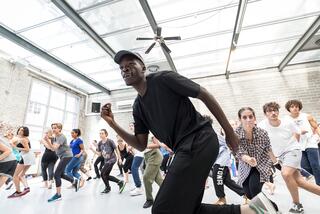
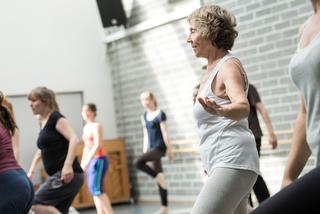
1996 – 1998
1997/98
A small miracle in cultural politics occurs: The laying of the new venue’s foundation at Erkrather Strasse!
tanzhaus nrw celebrated its opening at its new Erkrather Strasse location with a rousing two-week festival in April 1998. A small miracle in cultural politics: The new building’s cornerstone was laid by North Rhine-Westphalian minister Ilse Brusis, Düsseldorf’s Head of the Cultural Department Hans-Heinrich Große-Brockhoff and the Chairman of the Cultural Board, Wolfgang Kamper, in September 1996. In the following years, tanzhaus nrw won several awards for its successful urbanist architectural concept within the frame of the light-flooded tram depots, which is the oldest one in Germany, by the way. 1997 additionally saw a grand roofing ceremony that, in light of the conceptual and spatial changes afoot, signalled the change in name from “Werkstatt” to tanzhaus nrw – die werkstatt e.V.. The inception of the World Dance Alliance Europe (WDA Europe) with its base in the “Werkstatt” took place under the direction of Bertram Müller.
1996
In the year 1996, the “Werkstatt” received a 60-year long-term building lease for a part of the former tram depot at Flingern Süd’s Erkrather Strasse, by means of the confirmation of Düsseldorf city director Jörg Bickenbach and the Head of the Cultural Department of the City of Düsseldorf, Hans-Heinrich Große-Brockhoff. The stakeholders are successful in securing the construction loan of at least 16 million DM for the restoration of the tram depot in smaller increments; through the State of North Rhine-Westphalia (and its then-current Minister for Culture and Urban Development, Ilse Brusis) to the amount of 80% of the construction costs under the condition of the city’s additional support to the amount of 14% of the total costs and the provision of the house’s own funds to the amount of 6%.
The Düsseldorf employment office also comes in with an aid of 1,2 million with which they pay 20 construction workers in a labour creation scheme. The “Werkstatt” as builder responsible for the construction, together with Jochen Boskamp as the architect, begins to rehabilitate the 4,000 square metres of surface area at Erkrather Straße, turning it into the first dance house with eight studios, one large stage (capacity of 327) and a small stage (capacity of 89) nationwide.

1993 – 1995
The “Werkstatt” did not extend its lease on the Börnestrasse venue in 1995 after fifteen years as a tenant, with excessive rent demands among the reasons, and started its search for a domicile that would be better suited for the long run.
In 1993, “Werkstatt e.V.” and Hochschule der Künste (University of the Arts) entered into a cooperation to establish the European Dance Development Center (EDDC), with Aat Hougée and Mary Fulkerson as directors. Additionally, the “Werkstatt” received more and more recognition as a national multi-cultural meeting point in North Rhine-Westphalia. Experts attested to its exemplary orientation as a venue for intercultural exchange and to its agency for a mutual understanding of cultural identity.
1985 – 1991
1991
“Werkstatt” director Bertram Müller receives the coveted state order “Chevalier des Arts et des Lettres” for outstanding service in the “agency for foreign culture and arts and the establishment of the exemplary multi-cultural meeting point ‘Die Werkstatt’”. The first flamenco and oriental festivals take place in 1990.
1987
The “Werkstatt”, together with the Düsseldorf Schauspielhaus, establishes the Rheinische Tanz- und Theaterschule (RTT) (Rhenish Dance and Theatre School, RTT) that educated two classes with twelve participants each for the duration of two-and-a-half years. Director Stephan Müller serves as the school’s first didactic director.
1986/87
Following lengthy negotiation, the City of Düsseldorf agrees to raise its financial subsidy to around 300,000 DM, apart from rent, for the “Werkstatt” with its domicile at Düsseldorf’s Börnestrasse.
1985
The inaugural Düsseldorf “Strandtheatertage (Beach Theatre Days)” featuring film, international dance and theatre, under the “Werkstatt”’s auspices, became very successful in its three tents along the Düsseldorf Rheinpark.
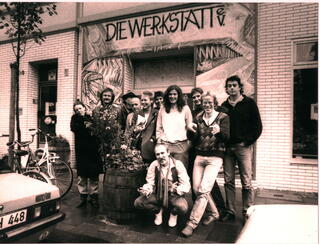
1982 – 1984
1984
Christoph Honig founded the “Werkstatt”’s Kukuk programme for children and youths, precursor to Düsseldorf’s AKKI. And the initiative for the foundation of JuTa (Junges Theater in der Altstadt/ City Centre Young Theatre), spearheaded by “Werkstatt” staff members Bernd Lohmann, Ernest Martin and Bertram Müller, brought in its first rewards.
1982
“Endlich haben sie es geschafft (They have finally done it)” (NRZ)! The “Werkstatt” opens its doors in Börnestraße, drawing in far more than 1,000 visitors and growing into a “Mekka der Kultur abseits von Opernhaus und Museen (cultural mecca beyond opera house and museums)” (Rheinische Post). More than 100 courses per week and more than 200 annual workshops took place in this year already. Around 100 performances were staged in the small new theatre.
1979 – 1981
1981
New “Werkstatt” accommodations are located in Düsseldorf’s Börnestraße 10! The city assumed five years’ rent liabilities for a start. 300,000 DM for the conversion and renovation of the 1,500 square metres building, however, must be procured by other means.
1980
The industry edifice at Grafenberger Allee 330, marked for demolition, was knocked down, despite, at this point, the lack of a new residence for the “Werkstatt”.
1979
The concept of the “Werkstatt” festival, later to become very successful, began, laying its foundation with the connection of performances, workshops and communication between artists and amateurs.
1978/1979
1979
The “Werkstatt” became a member of the Deutsche Paritätische Wohlfahrtsverband (DPWV), thus receiving subsidy for cultural further education granted by the State of North Rhine-Westphalia.
1978
The “Werkstatt” team received the 1. Allgemeine Kulturpreis (First Universal Culture Award) of the City of Essen for its exemplary work firmly situated in its urban quarter and thought-provoking impulse in cultural amateur work.
1978
With the presentation of a diverse programme featuring international theatre groups, the first “Werkstatt” summer festival succeeds in directing the attention of a broader public towards its quality and the concept of the “Werkstatt” itself, at the time thought of as a very alternative implementation and part of the counterculture.
1977/1978
1978
Non-profit-making association “Die Werkstatt für Tanz, Theater, Malen, Werken und Gestalten (Die Werkstatt for dance, theatre, painting, crafts and design)” was founded with the aim of furthering creativity and creative personas in amateurs, to support their immediate encounters with artists and the various cultures of the world.
1977
Led by the initiative fronted by Bertram Müller and a number of teachers and course participants, a debt relief of the proto-“Werkstatt” as well as a conceptional and organisational re-start could be reached. Despite a growing profile and popularity, the proto-“Werkstatt” project ran into dire financial predicaments as well as organisational difficulties. Important staff and teachers left the project. For the time being, the project ended in October 1977.
from 1973 onward
The first beginnings of the proto-“Werkstatt” trace back to 1973, when dance pedagogue Fe Reichelt temporarily moved her ballet school into an industry edifice marked for demolition at Grafenberger Allee 130. Individual artists like Chris Parker, Robert Solomon, Mustapha Teddy Addy, Winni Berger, Yves LeBreton and Magda Dewalle taught initial classes and workshops and occasionally staged performances that were organised, in an honorary capacity, by Uli Hoffmann and Ulrike Zellmann. Peter Achmed Kreusch, a pupil of Joseph Beuys’, developed the poster series that was to become a characteristic of the “Werkstatt”.
Bühne
Was gibt's aktuell im Programm zu sehen?
Akademie
Welche Tanzstile bietet das tanzhaus nrw an?

